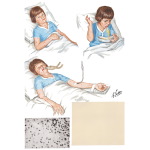 Reye syndrome, an extremely rare but serious illness that can affect the brain and liver, occurs most commonly in kids recovering from a viral infection.
Reye syndrome, an extremely rare but serious illness that can affect the brain and liver, occurs most commonly in kids recovering from a viral infection. Named after Australian pathologist R. Douglas Reye, who first reported it as a distinct syndrome in 1963, Reye syndrome is still not well understood. Studies have linked the use of aspirin or aspirin-containing medications during viral disease to development of Reye syndrome.
Cases have dropped dramatically since the finding of a link between the illness and aspirin use in children.
About Reye Syndrome
Reye syndrome predominantly affects kids between 4 and 14 years old, and occurs most frequently when viral diseases are epidemic, such as during the winter months or following an outbreak of chickenpox or influenza B.
Duration varies with the severity of the disease, which can range from mild and self-limiting to, rarely, death within hours. Although severity varies, Reye syndrome is a potentially life threatening disorder that should be treated as a medical emergency. Early detection and treatment are critical — the chances for a successful recovery increase greatly when Reye syndrome is treated in its earliest stages.
Signs and Symptoms
The signs and symptoms of Reye syndrome are almost always preceded by a viral illness, such as an upper respiratory tract infection (a cold, the flu, etc.), a diarrheal illness, or chickenpox. Many cases are mild and may even go undetected; others can be severe, requiring aggressive care.
Reye syndrome can occur from 1 day to 2 weeks after a viral infection. The viral illnesses that lead to it are contagious, but the syndrome itself is not.
Symptoms include:
- persistent vomiting
- lethargy or sleepiness
- in infants, diarrhea and rapid breathing
In the later stages, a child may exhibit irrational behavior, confusion, severe weakness, seizures, and loss of consciousness. There is usually no fever.
Reye syndrome is now very rare: only a few cases a year are reported in the United States. It should be considered, however, in a child with frequent vomiting or a change in mental status — particularly after a recent viral illness.
Prevention
Aspirin and other drugs from the salicylate family should never be used in the treatment of chickenpox, influenza, and other viral diseases.
In general, aspirin should not be used for kids or teenagers except on the advice of a doctor for certain conditions.
Treatment
Children with Reye syndrome are usually treated in a hospital; if seriously ill, in a hospital intensive care unit (ICU).
Treatment is supportive as there is no cure for the illness. The clinical care team focuses on making sure a child with Reye syndrome maintains proper fluid and electrolyte balance, nutritional, and cardiorespiratory status. Chances of recovery are greatest when these systems are as balanced as possible.
Mechanical ventilation (a breathing machine or respirator) may be necessary if breathing becomes too sluggish. Intracranial pressure (pressure of the fluid within the brain) and blood pressure may be monitored. Small quantities of insulin may be given to increase glucose metabolism, corticosteroids to reduce brain swelling, and diuretics to increase fluid loss.
The prognosis for children with Reye syndrome has improved. Earlier diagnosis and better treatment have increased the survival rate to about 80%. The earlier the syndrome is detected, the better the chances for survival. Children who progress to the late stages of the syndrome may suffer brain damage and disability.
When to Call the Doctor
If your child has vomiting, behavioral changes, or extreme sleepiness, especially after a viral illness such as the flu or a cold, contact your doctor immediately. Of course, many kids with viruses will have some of these symptoms, and most will not have Reye syndrome. Nevertheless, early detection is the key to successful treatment of Reye syndrome.